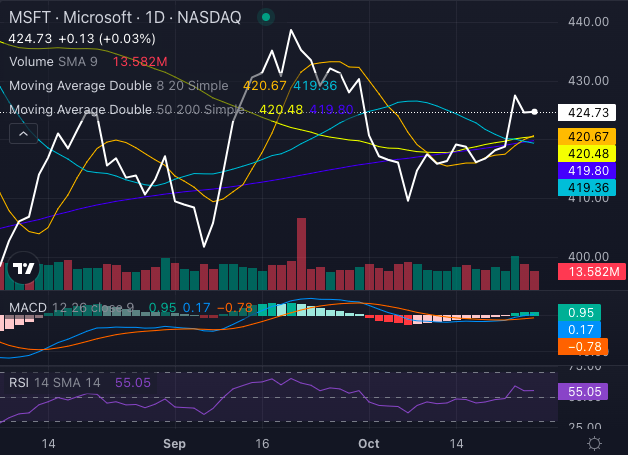As Microsoft Corp. MSFT prepares to release its first quarter earnings on Oct. 30, the tech giant’s AI and cloud services will be in the spotlight. Analysts estimate earnings per share at $3.09 and revenue of $64.48 billion.
Microsoft stock is up 24.67% over the past year, 14.52% YTD. Investors will be keen to see if Microsoft’s focus on AI and cloud can offset growing concerns over its high capital expenditures (CapEx).
Don’t Miss:
As first quarter earnings approach, Microsoft’s ability to turn its CapEx investments into tangible growth will be scrutinized. While Azure’s rapid expansion continues, Microsoft’s management will need to address how these investments in AI and cloud are paying off, especially in the face of economic uncertainty and potential regulatory scrutiny.
The stock might continue its streak as the charts remain bullish.

Chart created using Benzinga Pro
Microsoft stock at $424.73 is trading above the eight-day, 20-day and 50-day exponential moving averages, signaling ongoing buying pressure.
The Moving Average Convergence Divergence (MACD) indicator sits at 0.17, suggesting a continued upward trend. However, with an RSI of 55.05 and rising, Microsoft stock could soon be approaching overbought territory, which could signal potential near-term volatility.
Read Also: Warren Buffett once said, “If you don’t find a way to make money while you sleep, you will work until you die.” These high-yield real estate notes that pay 7.5% – 9% make earning passive income easier than ever.
In the fourth quarter, Microsoft’s Intelligent Cloud business posted a 19% revenue increase, driven by Azure’s 29% growth, with AI services playing a crucial role. As the company ramps up investments in data centers and AI infrastructure to meet demand, investors are questioning whether these hefty CapEx expenses will deliver returns soon enough to sustain Microsoft’s stock momentum.
Microsoft’s bet on AI is substantial — management projects a $3.50 return for every $1 invested in AI. With generative AI revenues expected to surge from $5.3 billion in 2024 to $35 billion by 2027, the company is positioning itself as a leader in the AI-driven cloud market.
However, the timeline for these returns remains a key question for analysts, especially with concerns over macroeconomic headwinds and fierce competition from Amazon Web Services (AWS) and Google Cloud.
While Microsoft’s AI and cloud focus offers long-term growth potential, investors will be closely watching the first quarter earnings for signs of near-term profitability and ROI on its significant CapEx investments.
With Microsoft stock is trading at bullish technical levels, any further acceleration in cloud or AI growth could push the stock higher, though CapEx concerns may continue to weigh on sentiment.
Read Next:
Photo: Shutterstock
Market News and Data brought to you by Benzinga APIs



